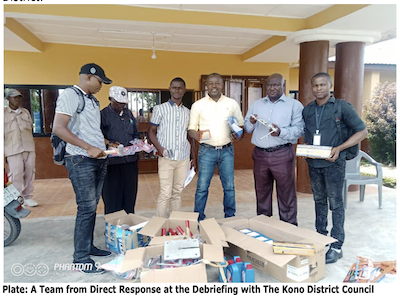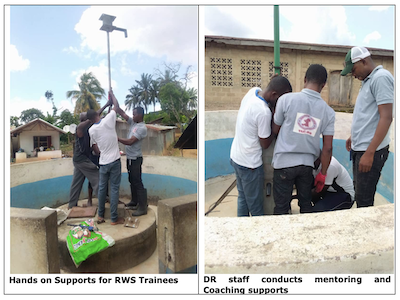+232 76 647970/+232 77 647970

Technical & Capacity Building Trainings for Youth and Women in Kono- Rural WASH Technicians/Pump Mechanics/Artisans/WASH Small Business Operators- Supports from SALWACO/.AfDB/Kono District Council/RWC: By Ibrahim B. Kamara, Founder & Executive Director- Direct Response (DR).
The purpose of the training is to provide participants with the needed skills and knowledge thus assisting rural communities to organize implement and maintain water supply facilities, good sanitation, and hygiene promotion in their various communities/localities. Therefore, pump technicians, sanitation promoters and latrine artisans training manuals were developed as central theme for the execution of these trainings across. The training guides are for trainers who conduct workshops, but handouts were also produced and distributed to participants to serve as reading and reference materials. The trainings specifically designed for individual with and without prior technical skills and knowledge needed to operate, manage, and sustain WASH facilities and services to further provide them with sufficient understanding and skills in the planning, construction, operation and maintenance of water supply and sanitation facilities.
focused on planning, construction, installation, maintenance and repairs process of India Mark II, solar submissible pumps and others, including preventative maintenance, pipelines and reticulation networks, various storage tanks, and inspection checklist for water supply systems. The latrine artisan manual elucidated on basic knowledge on hygiene, safety and climate change, technical procedures and fabrication of sanitation products and slabs; while sanitation marketing manual dealt with the evolution and concept of sanitation marketing, enterprises, and entrepreneurial skills.
Direct Response Development Organisation – DR one of the Leading Agency in WASH, with Funds from GoSL & AfDB and as part of the Rural WASH Consortium received Start-up Kits for Pump Technicians for assignment in Kono. The tools were specified to ascertain the tool number of items supplied their specifications and if in line with expectations for maintenance and repairs of water facilities.
Consequently, DR engaged the Kono District Council- and debriefed the Council Leadership on the availability of the tools officially planned the distribution at Chiefdom Levels with other respective stakeholders in the District.

Plate: A Team from Direct Response at the Debriefing with The Kono District Council
DR Team alongside District Stakeholders conducts Mentoring and Coaching to RWS Trainees across Nimikoro, Nimiyama, Tankoro, Gbense, Fiama, Kamara and Sandor Chiefdoms. The main objective is to strengthen RWS Trainees on the hands on training they benefited from and the practical use of the experience to assess and repairs water facilities that have been broken down for some times if not years.
This action brought chiefdom stakeholders onboard , conducts repairs and maintenance of broken water facilities in communities using the tools supplied without any recourse to outside the chiefdom for repair.

Hands on Supports for RWS Trainees
The management, monitoring and sustainability of activities focus on ensuring that key experts are deployed at assignment areas to effective and efficiently execute trainings based on the developed manuals. These experts ensured that community-based monitoring approach are adopted working alongside key stakeholders and trainees. The monitoring approach enhances community empowerment, improve quality, participation, informed policy actions and plans and innovations linked to WASH ownership and sustainability at all levels.
Coordination and collaboration with District Council/s – DC/s, MDAs and chiefdom authorities and existing community structures, such as WMCs, WDCs, Community Health Workers/Clubs, women and youths were engaged, mobilised and ignited their active participation throughout the selection of RWS technicians, as well leveraged participation in capacity building trainings and WASH systems strengthening. The action supported the LCs, relevant MDAs, water and sanitation service providers, entrepreneurs and businesses including community structures/Small Business Operators to carry out the monitoring and coordination required to achieve high quality of service. DR also supports district WASH coordination meetings at national and district level, provides regular updates on achievements and challenges

SLAPA Chairperson